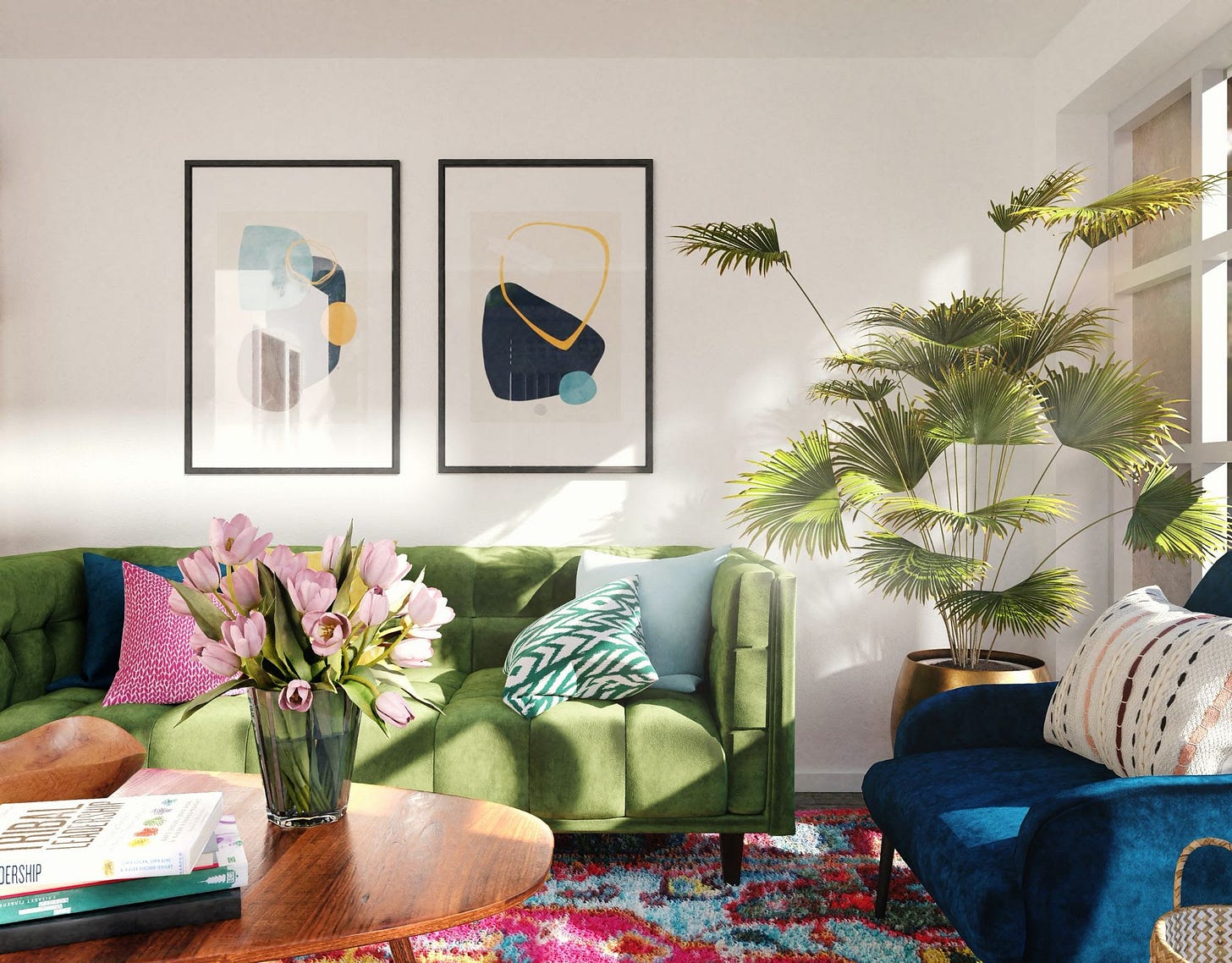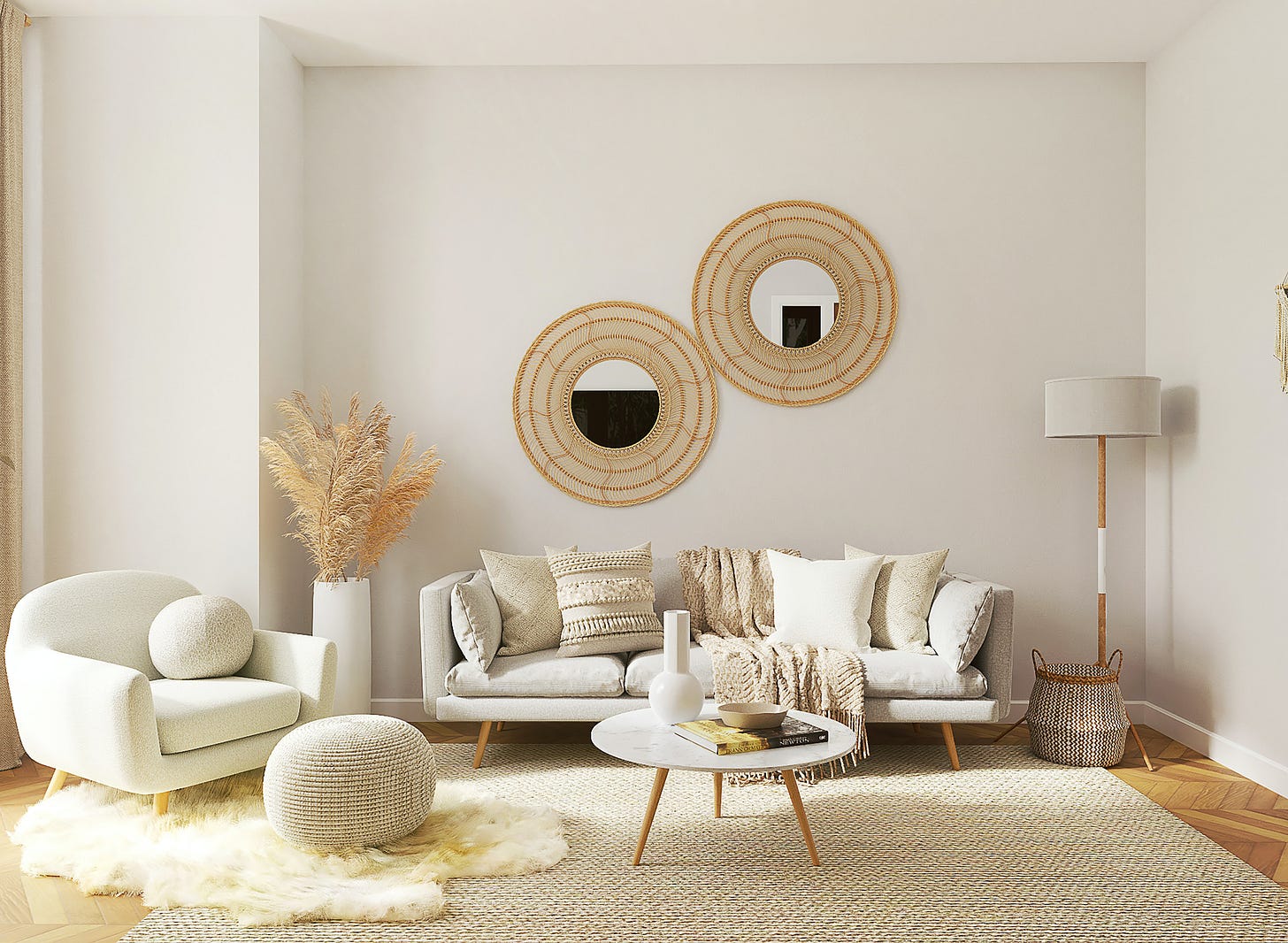This is not our forever home
Rejecting the myth of happily ever after.
Last week, Billy and I officially became homeowners. We closed on the house we’ve been renting since April, which, most excitingly, means that we don’t have to pack up our belongings and move. It means we already know which floorboards creak and what things need fixing. Buying this house also means we are familiar with the area; over the past few months, we have gotten to know our neighborhood, have identified plenty of good walking paths, and have a solid list of favorite takeout restaurants.
There are plenty of reasons to suggest that we may live in this house for a while. It’s zoned for a good school system, a prime real-estate checklist item for new parents. We love our porch and backyard and have enough space indoors for the three of us. We live within walking distance of my brother and sister-in-love, and are a short drive away from my mom. And we’re luckily becoming friends with some of our nearest neighbors.
But we aren’t calling this house a forever home. That’s not because we plan to move anytime soon or have our sights set on something bigger down the road. It’s because that phrase really bothers me.
For the uninitiated, “forever home” is a term used by real estate agents and countless hosts on HGTV shows. It suggests that buyers have found a house so perfect that they’d never, ever want to move again. A forever home is the opposite of a “starter home”—a phrase I also have issues with—a house that's meant to be a stepping stone to the next best abode.
To me, the concept of a forever home is as unrealistic as the romantic idea of a “one and only,” or the professional belief in a “dream job.” These things don’t exist! Yes, you might find someone to whom you feel amazingly connected, and yes, you might land in a job that’s everything you’ve always imagined, but at some point, the shine will wear off. Or, due to circumstances that may or may not be in your control, you might no longer be able to remain in your dream scenario.
None of this is your fault; though, in our forever-oriented mindset, it can be easy to blame yourself.
These concepts exist in our consumer-driven society because they give us something to constantly strive toward. It’s the real-life version of “happily ever after.” We tell ourselves that if we could just buy the perfect house, date the perfect person, or find the perfect job, then all of our problems will be solved. We’ll finally be happy. Forever.

Jamie and I got married when we were both 23. So young! We were the first among our wide circle of friends to tie the knot. Knowing this, I spent a lot of time thinking about how long we’d have to rack up an impressive-sounding number of years of marriage. “When we’re 43, we will be married for 20 years!” I’d crow. “And surely we’ll live to be 73. By that point, we’ll hit 50 years!”
We were so certain about hitting these milestones that we’d daydream about how we’d celebrate them. Jamie and I were already talking about hosting a small celebration at St. Pete’s iconic shuffleboard club to celebrate year 10.
But that never happened. Jamie died when he was 32—the year we were supposed to mark anniversary number nine.
In many ways, I considered Jamie my soulmate, my one-and-only life partner. He and I were wonderfully matched. Friends commented that we made them believe in love. I believed that the universe brought us together because we were meant to be.
After Jamie died, I had to challenge that notion. If I wanted to fall in love again, which I desperately did, then I needed to abandon the thought that the only person out there for me in the world was gone. In order to once again open my heart, I had to open my mind—to consider that other possibilities might exist.
I’m so glad that I did. If I met Billy before Jamie, I may have also considered him to be my one-and-only soulmate. He and I are also wonderfully matched. We’ve made a beautiful life together, along with an incredible child who gets smarter and sweeter by the day.
It’s tempting to call Billy my forever person—this time, he’s mine for life!—but I know better than to do that. Just like I can’t predict how long my life will last, I can’t predict how long Billy will live. Nothing about the longevity of our relationship is guaranteed, except that we have promised to love each other for as long as we’re alive.
As I was brainstorming this essay, I watched a couple of episodes of Property Brothers: Forever Home, the Scott brothers’ latest franchise. Every time one of the twins said “forever home,” I’d laugh. It sounded like they were cheerfully suggesting renovations to a place where the homeowners would die and later be entombed in. As if trying to upsell couples to a much fancier coffin.
Watching that feel-good show made me realize my stance might sound cynical—to push back against the concept of a forever home, relationship, or job. Truly, I don’t mean to be a killjoy!
Instead, I think abandoning these concepts can be freeing. It releases us from a narrow mindset—this one thing will solve my problems—and invites us to look at the world from a place of abundance. There are many things, at many different times, that will bring me joy.
Recent research has found that overemphasizing happiness winds up, ironically, making us less happy. People who obsess about being happy are more likely to ruminate on failure and negative emotions when they happen, creating more stress and unhappiness in the long run. I suspect this also applies to fixating on the things that are supposed to bring us happiness: When those things are inevitably less than perfect, it’s harder for us to face than if we didn’t have such high expectations in the first place.
There’s no such thing as a forever home. Nor a perfect partner or a dream job. Everything has its pitfalls, just like we all do. And nothing lasts forever. By accepting the impermanence of things, we can better appreciate the present moment.
Our new house has its charms and its flaws. It may or may not be the place we live in for the rest of our lives. For now, though, it’s a pretty perfect fit for our family of three. And that is something to be incredibly grateful for.
xoxo KHG
p.s. We all have told ourselves some version of the same lie: When I buy/accomplish/find/etc. this thing, I’ll finally be happy. Tell me about your “happily ever after” scenarios—have you achieved some version of it? Or do you find yourself still pining after a particular dream? You can share by replying to this email, leaving a comment, or sending me a message. I can’t wait to read your responses!
As always, reader replies will be part of Friday’s newsletter, which is for paying subscribers.
💖 Sharing is caring
Can you tell that my upcoming wedding anniversary is on my mind? Shoutout to Indira, who shared this post (with an admittedly weird preview image, my bad!) back in 2019.


Word of mouth is gold in the newsletter world! Please consider sharing My Sweet Dumb Brain on social media, recommending it to a friend, or—if you haven’t yet—becoming a paid subscriber. Thank you!
My Sweet Dumb Brain is written by Katie Hawkins-Gaar. It’s edited by Rebecca Coates, who lately finds herself leaning into the mantra, “This is a phase.” Sometimes, the idea that things won’t last forever is quite a comfort. Photos by Spacejoy on Unsplash.





I built a startup. My family was in tough financial shape before that and there was a sale of the company on the horizon a few times. Always thought "once we sell the company and pay off our debt we'll be so happy". Then we did that. We were in a great financial spot. Turns out there were other things inherent in why I wasn't happy underneath. Then I started doing the real work. On me. On who I wanted to be. A few years later and I can truly say I'm happier than I've ever been. But there is still more to go and more I want to work on. The difference is now I appreciate each day for what it is - the day I am living in on that day. No more waiting for that magic solution.
My forever dream is to lose weight. I struggle so hard with this and body image and I want to finally be happy with my weight and how I look... I told myself it would be milestones with my health that would make me feel good in my own skin, but when that occurred-- I wasn't happy with my weight still. So idk. I don't think forever dreams are ever realistic for anyone. I just think we all dream in color not enough black and white and it seems that it's possible and feasible-- but it never is.